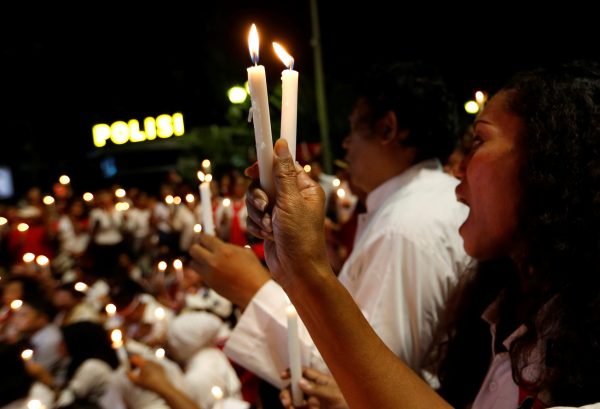The Indonesian National Police Chief General Tito Karnavian initially identified the family as returnees from Syria, but a few hours later he clarified that the family had not been to Syria. He later added that the father, Dita Oeprianto, had been in contact with a family that was deported from Turkey for their alleged intention to join extremist groups in Syria. Tito claimed that the deportee family was the main ideological influence on Dita and his family. These contradicting statements are problematic and reveal fundamental gaps in Indonesia’s counterterrorism, surveillance and deradicalisation efforts.
Tito claimed that over 1100 Indonesians have emigrated to Syria. Of those, 500 people remain in Syria, 103 have been killed in Syria and around 500 people have returned to Indonesia. In 2017, 226 deportees underwent rehabilitation programs. Under existing anti-terrorism law, Indonesian authorities cannot arrest returnees and deportees unless there is ample evidence of their involvement in terrorist networks.
On 25 June 2017, the first terror attack by a returnee from Syria in Indonesia was launched against the police in North Sumatra. Syawaludin Pakpahan, a returnee from Syria who fought alongside the Free Syrian Army, stabbed a police officer to death at the provincial police headquarters in Medan. Syawaluddin went to Syria in 2013 and stayed there for about 6 months. He learned about being a militant from internet sites and the Telegram messaging application.
The authorities struggle to monitor the movement of returnees because it is difficult to track down people who individually return to Indonesia. Returnees and deportees often move from one place to another to avoid surveillance.
It is also difficult to stop those who are planning to go to Syria. There is no direct route to Syria and people often make multiple stops before making it to Turkey — the main transit point before crossing the Syrian border. Aspiring jihadis can access the necessary documents to travel overseas. Indonesians can easily obtain a Visa on Arrival in Turkey.
Passport applications require an identity card, a birth certificate and a family registration card to confirm the applicant’s identity. Migrants who aspire to become jihadis can modify their documents to deceive Indonesian government officials and secure a passport. Identity cards and family registration cards are issued by community-level administration bodies, which may be susceptible to bribery or corruption. In other words, the Immigration Office cannot strictly scrutinise such documents without support from the lower level administration systems.
The suggestion that the perpetrators of the Surabaya church bombing were radicalised by deportees is unsettling because the Indonesian government has rehabilitation and reintegration programs for deportees once they return to Indonesia. Deportees must undergo a rehabilitation program for one month at the Ministry of Social Affairs’ social shelters in Bambu Apus. This duration seems to be inadequate in deradicalising those deportees who have been radicalised over months or even years.
Yet there are no other options because the shelters cannot accommodate the influx of deportees for more than a month. The reintegration phase, which should play a pivotal role in deradicalising deportees, is not run effectively. A lack of coordination and transparency between the government and civil society organisations creates impediments to engaging deportees in reintegration programs.
The case of the Surabaya church bombing attack is not the only one involving deportees who are still highly radicalised. Anggi Indah Kusuma (who also uses the alias Khanza Syafiyah Al Furqon), a former migrant worker, was deported from Hong Kong in March 2017 after posting a video of her bai’at (pledge of allegiance) to IS. She joined an earlier iteration of Indonesia’s rehabilitation program and was repatriated to her parents’ house in Klaten, Central Java. After a few weeks, she left her house and married a man whom she met in a Telegram messaging group. She moved to Bandung and was arrested for planning attacks on Pindad (an Indonesian state-owned arms company), the state palace and the Mako Brimob detention centre.
Many commentators have called for a more comprehensive anti-terrorism law to enable the authorities to take preventive measures to handle returnees and deportees. But it would be more important for Indonesia to create a clear chain of coordination and enhance transparency among the relevant agencies involved in counterterrorism. The government must also engage administration offices and the security apparatus at the lower levels to implement a community-level counterterrorism strategy.
Chaula R Anindya is a Research Analyst with the Indonesia Programme at the S Rajaratnam School of International Studies (RSIS), Nanyang Technological University, Singapore.

